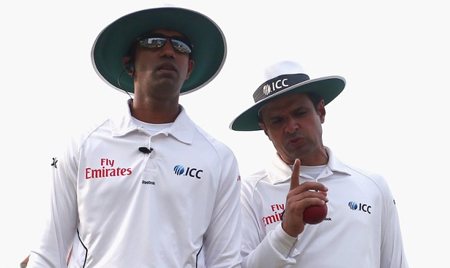 Dubai, July 17: The ICC on Tuesday admitted that the umpires made seven errors during the first Ashes Test between Australia and England of which four were rectified using the Decision Review System, which has ignited a fresh debate on the technology.
Dubai, July 17: The ICC on Tuesday admitted that the umpires made seven errors during the first Ashes Test between Australia and England of which four were rectified using the Decision Review System, which has ignited a fresh debate on the technology.
The three decisions that were marked as uncorrected errors included the one against Jonathan Trott when a correct leg before wicket decision was overturned. The other involved Stuart Broad (catch at slip and leg before wicket not offering a shot) but these could not be corrected as Australia had no reviews available, the ICC said in its assessment of umpires and analysis of the DRS.
The ICC said the umpires made a total of 72 decisions, which is well above the average (49) for a DRS Test match.
“The umpiring team was assessed to have made seven errors during the match, out of which three were uncorrected decisions and four decisions were corrected using the DRS,” the ICC said in the statement.
“As such, the correct decision percentage before reviews stood at 90.3 per cent but climbed to 95.8 per cent as a result of the use of the DRS. This represented an increase of 5.5 per cent in correct decisions, which was the average increase from DRS Test matches in 2012-13. “When coupled with conditions, with reverse swing and spin playing an important role, and the added intensity of the first Ashes Test, it was a difficult match to umpire,” the statement said.
Reflecting on the assessment, ICC Chief Executive David Richardson said: “The umpires did a good job under difficult conditions. This reflects the calibre of umpires Dar, Dharmasena and Erasmus who have consistently performed at a high level. However, like the players, umpires can also have good and bad days but we all know that the umpire’s decision, right or wrong, is final and must be accepted.
“While the ICC has complete faith in the ability of its umpires, our confidence in technology is also strengthened by the fact that there was an increase in the number of correct decisions in the Trent Bridge Test through the use of the DRS,” he said. “If technology can help increase the correct decisions by 5.5 per cent, then it is a good outcome, but we must continue to strive to improve umpiring and the performance of the DRS.”




Comments
Add new comment